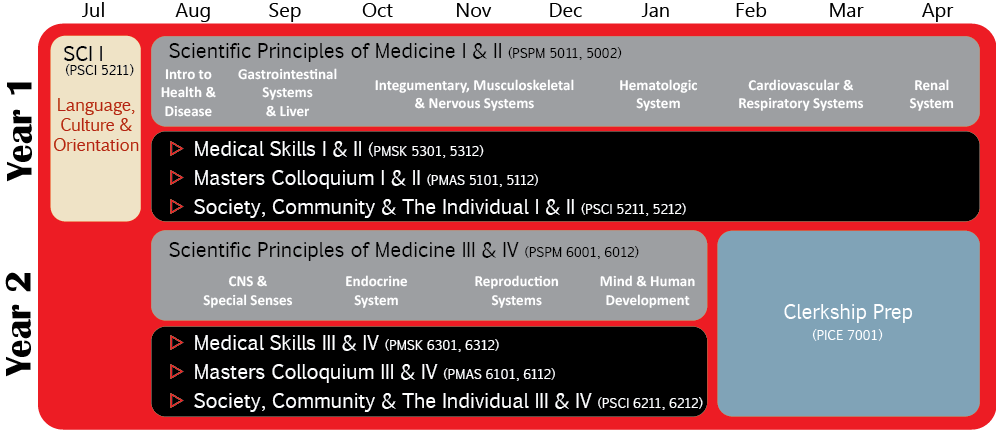SCI Community Clinic Preceptor Resources

Where do our SCI Preceptors fit in the Pre-Clerkship Phase Doctor of Medicine Program Curriculum?
Community–based preceptors are a part of the Society, Community, and the Individual course. The Society, Community, and the Individual (SCI) course (PSCI 5211, 5212, 6211, 6212) is the first one students take beginning with a three week summer immersion on community health themes. The course is designed to expose students to the social foundations of medicine, biostatistics and epidemiology, the interpretation of clinical research data, and conversational and medical Spanish. A major emphasis of the course is how social, cultural, economic, political, and environmental forces affect, and are affected by, the health of individuals. In addition to working with community physicians and other health care providers as part of the SCI experience, students will enhance their ability to effectively communicate with Spanish speaking patients. The course also offers students the opportunity for meaningful engagement in service-based learning.
The pre-clerkship curriculum consists of four main courses of which SCI is one cornerstone. The courses are the Scientific Principles of Medicine (SPM); Medical Skills; Society, Community, and the Individual; and Masters’ Colloquium. In addition, students participate in two longitudinal experiences via the Integrated Curricular Elements (ICE) Program and the Scholarly Activity and Research Program (SARP).
Four of these courses span the first two years of the curriculum and are highly integrated with one another. The centerpiece of the curriculum is Scientific Principles of Medicine (PSPM 5011, 5002, 6001, 6012), which is organized around roughly 77 clinical presentations (e.g., sore throat, abdominal pain, chest discomfort) that are assigned to an appropriate organ system block or unit. Each of the clinical presentations (CPs) is delivered to students by an expert clinician faculty member in the form of a clinical scheme that serves as the basis for the instruction in the basic science concepts and content relevant to an understanding of the pathophysiological processes associated with a given clinical presentation.
Closely aligned with SPM, is the Medical Skills (PMSK 5301, 5312, 6301, 6312) course where students learn to take focused histories and conduct physical examinations on patients presenting with the clinical problems that are being addressed concurrently in SPM. For example, when learning the basic sciences relevant to understanding chest discomfort in SPM, Medical Skills covers how to take histories and perform physical examinations on standardized patients presenting with chest pain. This course takes place primarily in a state-of-the-art clinical skills and simulation laboratory where students practice with standardized patients, partial task-trainers, and high-fidelity human body simulators.
Another course spanning the first two years of the curriculum is Masters’ Colloquium (PMAS 5101, 5112, 6111, 6112). The Paul L. Foster School of Medicine (PLFSOM) has created learning communities called “colleges,” led by college masters who are responsible for organizing a weekly masters’ colloquium focusing on the art and science of medicine with specific emphasis on issues related to professionalism. The colloquium is primarily a discussion-based course with selected readings and in-class exercises designed to promote critical reflection and the exchange of ideas.
The Integrated Curricular Elements (ICE) Program contains curricular requirements that intentionally span the pre-clerkship and clerkship phases. ICE requirements occur in each year. There are credit and non-credit components of the ICE program. The Clerkship Prep Course (PICE 7001), a main requirement of the ICE program, is an eight-week credit-based course occurring at the end of the MS2 year, which ensures students possess the essential knowledge and skills required for entry into the clerkship phase of their medical training. The major elements of this course include Advanced Cardiovascular Life Support (ACLS) training, Tankside Grand Rounds (TSGR), an Objective Structured Clinical Examination (OSCE), a self-directed learning phase, and the National Board of Medical Examiners’ Comprehensive Basic Science Exam (NBME CBSE).
